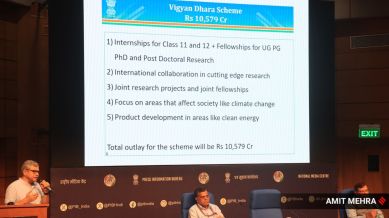To boost research, Cabinet clears Vigyan Dhara, biotech initiatives
The scheme has three broad components -- science and technology institutional and human capacity building; research and development; and innovation, technology development and deployment.

The Centre Saturday approved two key science initiatives to strengthen the research base and accelerate search for science and technology solutions to some of the country’s pressing needs in sectors like clean energy.
The Union Cabinet decided to merge several existing science promotion programmes being run by the Department of Science and Technology (DST) under a new initiative called Vigyan Dhara that, it hopes, would result in better fund utilisation, and improve efficiency. It also approved a biotechnology initiative that will push for research and development, industrialisation and manufacturing in the biotechnology sector.
monthly limit of free stories.
with an Express account.
Official sources said the overall objective of initiatives was to focus scientific energies on some specific areas that were key to India’s sustainable growth and development in the coming decades.
Vigyan Dhara, for example, merges several existing DST schemes including the INSPIRE programme that works to attract young talent to science research.
“Vigyan Dhara has three broad components — human and institutional capacity building, research and development, innovation and technology development, and also deployment. Existing schemes would fall under one of these components. There are two big benefits of Vigyan Dhara. DST gets the flexibility to reorient schemes within the broad framework of achieving the three objectives. This can include reallocation of funds as well… The second thing is the ANRF (Anusandhan National Research Foundation, a newly created institution) is creating its own programmes. It is important to avoid duplication of work and energy. The flexibility of the DST to refashion its existing programmes helps in this as well,” DST Secretary Abhay Karandikar said.
On biotechnology side, the new initiative aims to support innovation-driven research and development across six thematic areas. The first will focus on bio-chemicals, bio-enzymes, and bio-polymers, which will mainly have industrial, consumer, and scientific applications.
The second pillar will focus on smart proteins and functional foods. Union I&B Minister Ashwini Vaishnaw — while briefing reporters on Cabinet decisions — said one of the critical challenges that India faces is feeding its 140 crore people. The second pillar will focus on developing functional foods that can complement land-based food production, thereby reducing pressure on land resources.
The third will focus on bio-therapeutics. Targeted therapy is emerging as the cutting-edge treatment for several genetic conditions and cancers.
The fourth will focus on agriculture, supporting development of bio-fertilizers and bio-pesticides. Vaishnaw said this will help make agriculture resilient and also reduce levels of chemicals in foods. The fifth will focus on developing bio-fuels and bio-chemicals, especially those that are developed from captured carbon emissions. This will help in creating a circular economy, said Vaishnaw. And, last area was marine and space application to focus on developing products from marine ecosystems.
“Just like the industrial revolution and IT revolution, there will be a bio-revolution in the coming days. All fields related to biotechnology and bio-sciences will create a big economy,” he said.